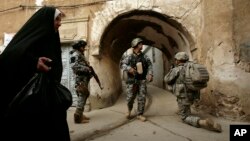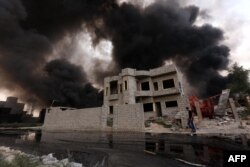The United States and Iraq have agreed on a plan that will send about 600 additional American troops to Iraq to help retake Mosul from Islamic State, Secretary of Defense Ash Carter announced Wednesday.
Speaking to reporters in New Mexico, Carter said the increase was part of the coalition's "accelerating campaign" to "isolate and collapse" IS control over Mosul and "expand gains by Iraqi Security Forces elsewhere in Iraq."
A U.S. defense official put the total number at 615, bringing the number of American troops authorized to fight IS in Iraq at 5,262.
Carter said the additional U.S. military personnel would train, advise and assist Iraqi Security Forces and Kurdish Peshmerga. They also will be used to improve logistics and to intensify intelligence operations with a "special emphasis" on uncovering IS plans to launch terror attacks against Baghdad and the West, he said.
Carter also echoed other top U.S. defense officials who have suggested the battle to retake Mosul could get underway in a matter of weeks.
"I'm confident it's going to happen," he said. "We're on schedule in terms of marshaling the forces there."
‘Final’ number needed
President Barack Obama and Iraqi Prime Minister Haider al-Abadi agreed on the details of the deployment, which Carter said was recommended to the president by him and U.S. Chairman of the Joint Chiefs of Staff Gen. Joe Dunford.
In a statement Wednesday, the Iraqi prime minister said Obama was consulted on a request from the Iraqi government for a "final increase" in the number of trainers and advisers "under the umbrella of the international coalition in Iraq."
Carter said the U.S. has long seen this increase as the final number of American troops required "for the envelopment and seizure of Mosul," adding that the U.S. would assess Iraq's future needs with Abadi.
"It will continue to be his decision," Carter said.
The new U.S. forces will be deployed to several locations across Iraq, including Al-Asad Air Base in Anbar province, about 350 kilometers south of Mosul.
"They'll be helping with airfield operations and bringing the state of that airfield up to a level at which it can support a greater pace of operations," Pentagon spokesman Capt. Jeff Davis told reporters Wednesday.
Other troops will be sent to Qayyarah West, an airfield about 60 kilometers from Mosul, that is being built into a major logistics hub, although for now it still has what officials describe as a limited aviation capability.
Tough fight ahead
U.S. defense officials see both air bases as critical for Mosul operations, given the city's relative isolation from other major population centers. They could also play key roles in any fighting that takes place once Mosul is finally liberated from IS.
But Mosul is the tipping point.
"This is it," Davis said. "Mosul is the last major bastion that they hold."
"Once it is clear, and it will be clear of ISIL, what's left is going to be significantly less difficult," he added, using an acronym for Islamic State.
Despite the growing optimism, U.S. military officials are still expecting a tough fight from the approximately 5,000 IS fighters left defending Mosul.
"They've built a hell on Earth around themselves," Operation Inherent Resolve spokesman Colonel John Dorrian warned Pentagon reporters Friday via video link from Baghdad.
He said it appears IS has dug trenches around the city, to be filled with oil and set afire as Iraqi forces move in.
The U.S. also says IS fighters in Mosul are trying to use schools, hospitals and mosques to hide their operations and have been planting improvised explosive devices intended to slow any advance by coalition-backed forces.






